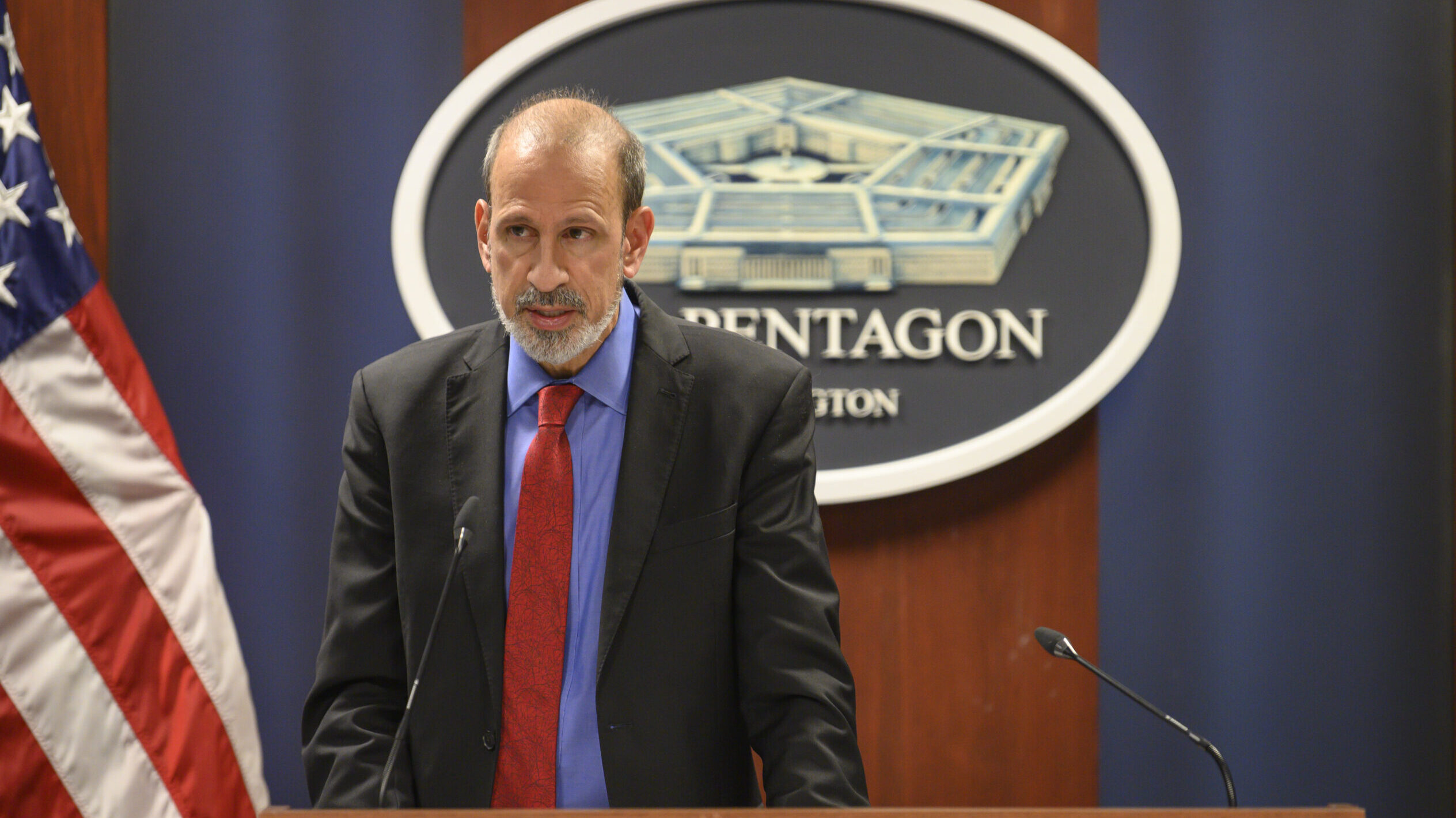
Under Secretary of Defense Comptroller Mike McCord speaks during a press conference presenting the 2021 Department of Defense’s audit results, the Pentagon, Washington, D.C., Nov. 15, 2021. (DoD photo by U.S. Air Force Staff Sgt. Brittany A. Chase)
WASHINGTON — While the Pentagon is not yet ready to request a new supplemental spending bill to cover funding in Europe and the Middle East, a top DoD official tells Breaking Defense that barring the sudden conclusion of the conflicts in Ukraine and Israel, the department will “likely” need another funding package from lawmakers.
“After a long, hard road we got the [previous supplemental] at the end of April, so we’re still on that. Of course, we are not, at this time, working on one for FY25, which hasn’t started yet. But if nothing changes, we will need to,” DoD Comptroller Mike McCord said in an interview at the Pentagon.
Accordingly, McCord said officials will likely begin crunching the numbers for another supplemental at some point in the future, just so that they can be ready in case they’re called upon. And though he didn’t have a dollar number in mind, “It would definitely start with a B.”
The mega $95 billion supplemental bill passed by Congress in April — which provided aid for Ukraine, Israel, Taiwan and other priorities like submarines — gave a needed boost for a DoD that had been left “high and dry” after a prolonged continuing resolution (CR) and protracted congressional impasse over the aid package, McCord said. Much of the money marked for Ukraine is actually being used to replenish the DoD’s own weapon stocks that have been transferred to Kyiv, a pattern that would prompt a need for another package if it persists.
“It would take a big change for us not to still be in that line of work and wanting to restock our inventories and all that,” McCord said of aid for Ukraine. Supplemental spending for Israel, he reasoned, is a less certain need, since factors like a hostage deal could potentially help ease hostilities.
“So [Israel] could go a bunch of different ways, but Ukraine, it’s more easy to see that on the current trajectory, you would think another supplemental would be likely, and everything else is much more uncertain than that, I would say,” McCord said.
One reason officials like McCord aren’t currently working on another package is simply because of the structure of the one passed in April. While some authorities included in the bill expire at various dates — such as September or December of this year, or next September — McCord said legislators largely meant to cover spending through the end of this year, or the first quarter of FY25. But politically, that timeline means the package lasts “right up to the brink of a transition of administration.”
While Democratic nominee Vice President Kamala Harris has publicly called for continuing support for Kyiv, aid under a Donald Trump administration is far less certain. The Republican nominee has suggested cutting assistance, while his running mate, Ohio Sen. JD Vance, voted against the Ukraine aid passed in April and wrote in the New York Times that he “remain[s] opposed to virtually any proposal for the United States to continue funding this war.”
The pending results of the November presidential election, as well as congressional races, means that another supplemental is “a future decision point,” albeit one that McCord and other officials will keep in mind.
“We’ll probably be working up something so that if someone calls on us to say, ‘Hey, I think we want to approach Congress about this,’ that we have something,” he said. “We’re not doing that yet, but it’s on my mental, you know, to do list. We could get asked this question, [and] we would be well-served to have done some homework.”
RELATED: Biden’s lame-duck period gives him a chance to reshape American security
Hellenic dome? Greece touts ‘Achilles Shield’ air defense system to free up ships, fighter jets
It remains to be seen if Athens is set on acquiring Israel’s Iron Dome or holds interest in other solutions, but at a more general level, Achilles Shield is part of an extraordinary modernization push.
The “earliest” time to submit a supplemental would likely come in the lame-duck session after the November election, McCord said, though “if it goes any further than that, it’s going to be TBD, whose decision it is whether to pursue it or not pursue it.”
Continuing Resolution
Meanwhile, the prospect of another extensive CR looms over the Pentagon. Key congressional defense committees have largely completed their FY25 mark-up process, but a topline deal is nowhere in sight, particularly as some legislators have called to circumvent the spending caps imposed by the Fiscal Responsibility Act.
Failure to reach a deal by the end of September means that the Pentagon will once again begin the new fiscal year operating under a CR, freezing spending at FY24 levels — assuming that a stopgap deal is reached to prevent a government shutdown. It’s a trend the DoD has become accustomed to in recent years, which officials like McCord are preparing for accordingly.
“I have been sort of bludgeoned into being desensitized to [CRs] that go all the way to December in situations like this,” McCord said. “I would love to see it only go… ‘til right after the election. But I think that would surprise me if it didn’t go straight to December. And I’ve heard that there are people out there who want to have it straight go into a good bit longer than that, which would be very discouraging.”
In a Wednesday roundtable with reporters, Air Force Chief of Staff Gen. David Allvin said that “losing momentum” is his biggest concern when faced with the prospect of another CR, particularly as his service is underway with numerous modernization efforts.
“I’m not saying there’s a particular date or a year, but now that we know where we need to go and how fast we need to get there, any sort of slowing of the momentum is harmful,’ Allvin said. “The contingency plans are just to ensure that we can focus on the things that will provide us irreversible momentum sooner than others.”
The White House’s Office of Management and Budget, which oversees the budget of all federal agencies, is readying to communicate the Biden administration’s position on another CR perhaps by the end of this month, McCord said. And though he’s now somewhat used to the recent occurrences of coming right up on the deadline when funding may expire, that doesn’t make it any easier.
“Every deadline now we get real close,” he said. “What else would I expect now, except waiting until the last minute to hear what it is… So we’re sort of trying to not think about that, but as we get closer to September, we’ll be getting that by now well-oiled machine of planning for bad things oiled up.”


























